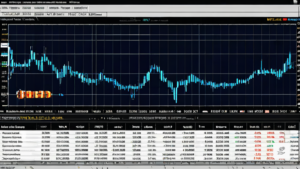Mastering the Art of Futures Trading: Crafting a Strategic Roadmap for Traders

Decoding the Future: Unveiling the Essence of Trading Plans
Embarking on a journey into the world of futures trading requires meticulous planning and strategic foresight. At the core of this endeavor lies the pivotal concept of a trading plan, a compass that guides traders through the turbulent waters of the financial markets.
Exploring the Blueprint: Understanding the Components of a Trading Plan
A trading plan serves as the bedrock of a trader’s investment strategy, customized to align with individual goals and aspirations. It is a personalized roadmap that outlines entry and exit rules, risk management strategies, and position sizing parameters.
Crafting Your Path: Building a Trading Plan Tailored to Your Objectives
The journey of constructing a trading plan begins with introspection and goal setting. By delineating your investment objectives and risk tolerance, you pave the way for a robust and sustainable trading strategy.
Navigating the Terrain: Strategies for Success in Futures Trading
Embracing Diversity: Tailoring Trading Plans to Different Time Horizons
Traders operating on varying timeframes, be it short-term day traders or long-term investors, must adapt their trading plans to suit their preferred trading style. While day traders focus on technical analysis indicators, long-term investors prioritize fundamental analysis and portfolio performance.
Risk Management Mastery: Mitigating Volatility Through Strategic Planning
Effective risk management lies at the heart of a sound trading plan. By defining risk tolerance levels, setting stop-loss orders, and diversifying positions, traders can navigate market uncertainties and safeguard their capital.
The Path to Proficiency: Key Steps in Developing a Winning Trading Plan
Harnessing Expertise: Aligning Skills with Investment Objectives
Successful trading hinges on leveraging one’s strengths and interests in the financial domain. By matching skills with investment choices, traders can enhance their performance and capitalize on market opportunities.
Emotional Intelligence: Navigating the Psychological Landscape of Trading
Managing emotions such as fear and greed is paramount in trading success. A well-crafted trading plan acts as a buffer against impulsive decisions driven by emotions, fostering a disciplined and rational approach to trading.
Evolving Strategies: Adapting and Enhancing Your Trading Plan Over Time
Continuous Improvement: Learning from Past Trades and Market Dynamics
Reviewing past trades, analyzing market trends, and adapting to changing market conditions are essential for refining trading strategies. By staying abreast of market developments and honing their skills, traders can optimize their performance and stay ahead of the curve.
Performance Evaluation: Tracking Progress and Identifying Areas for Growth
Regularly monitoring investment performance and reviewing trading outcomes offer valuable insights into the efficacy of a trading plan. By evaluating successes and setbacks objectively, traders can fine-tune their strategies and elevate their trading proficiency.
Navigating the Future: Upholding Discipline and Vision in Trading Endeavors
Staying Committed: Upholding Trading Plan Integrity Amid Market Fluctuations
Adhering to the principles outlined in a trading plan, even in the face of market volatility, is crucial for long-term success. By maintaining discipline and resisting impulsive deviations, traders can stay focused on their objectives and navigate market challenges with resilience.
Strategic Vision: Balancing Risk and Reward in Pursuit of Trading Excellence
Achieving trading excellence requires a delicate balance between risk-taking and reward-seeking behaviors. By strategizing prudently, adhering to predefined trading rules, and cultivating a forward-looking mindset, traders can forge a path towards sustained profitability and professional growth.




